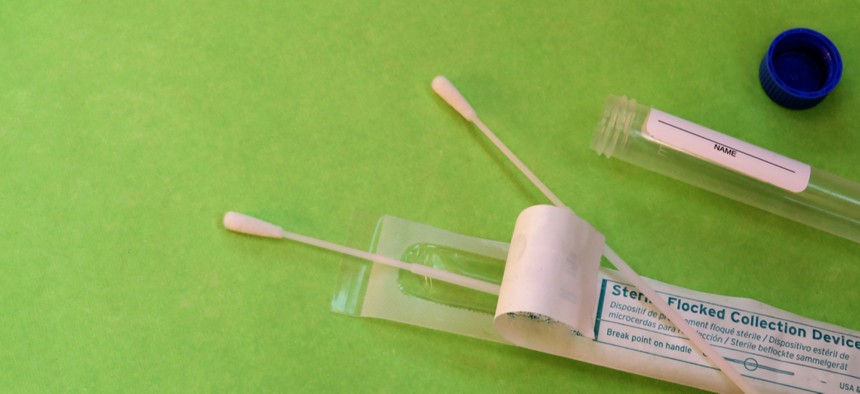Justice to Require DNA Sampling of Nearly All Detained Migrants

Katy Pack/Shutterstock.com
Once collected, the samples will be moved into the FBI’s massive DNA database.
The Justice Department aims to drastically expand its collection of DNA samples to cover nearly all migrants who are held, even temporarily, in custody.
The agency unveiled plans Monday to restore a rule in the DNA Fingerprint Act of 2005, subsequently directing the Homeland Security Department to capture DNA samples from detained migrants—and send those samples to be analyzed and included in the massive FBI database that law enforcement officials use to identify criminals across the U.S. The ultimate goal, officials said, is to reduce crime and support investigations.
“The proposed rule change would help to save lives and bring criminals to justice by restoring the authority of the Attorney General to authorize and direct the collection of DNA from non-United States persons detained at the border and the interior by DHS, with the ultimate goal of reducing victimization of innocent citizens,” Justice’s Deputy Attorney General Jeffrey Rosen said in a statement.
Homeland Security initially indicated its plan to increase DNA collection in migrant detention facilities across the nation earlier this month, though it did not clarify when the collection would begin.
Under the original law, DNA sampling is already allowed on anyone who is not an American citizen and is detained by a federal agency, or anyone arrested, charged or convicted of a felony or violent crime. The newly proposed rule would eliminate a provision to that law that Justice published in 2008, which allowed Homeland Security to consult with the AG and exempt itself from DNA sample collection due to a lack of resources or other limitations.
Currently, officials collect the DNA of migrants once they are prosecuted in federal court for a criminal offense. DHS is also ramping up its collection of biometrics on the U.S. border and Customs and Border Protection already collects fingerprints of people in its custody who are over the age of 14. But the new rule would expand the collection of DNA to all adults who attempt to cross illegally and are detained by CBP or Immigration and Customs Enforcement.
The new provision also calls for the collected samples to be submitted into the FBI’s DNA sample processing infrastructure—known as the Combined DNA Index System, or CODIS. The system is currently accessed by federal, state and local law enforcement officials and used in investigations across the U.S. As of August, it was used to assist more than 465,000 criminal investigations. Justice noted in the announcement that “FBI will provide DHS with the DNA collection kits, analyze the samples, and ensure that law enforcement agencies use the results in accordance with the FBI’s stringent CODIS privacy requirements.”
But the move was not made without criticism from privacy advocates.
“Forced DNA collection raises serious privacy and civil liberties concerns and lacks justification, especially when DHS is already using less intrusive identification methods like fingerprinting. Our DNA not only reveals deeply personal information about us but also information about our relatives,” Vera Eidelman, a staff attorney at the American Civil Liberties Union, said in a statement earlier this month when the program was announced. “This kind of mass collection alters the purpose of DNA collection from one of criminal investigation to population surveillance, which is contrary to our basic notions of freedom and autonomy.”
Homeland Security and Justice officials are now working collaboratively to initiate a pilot program for the DNA collection of non-U.S. citizens that agencies detain. They expect to roll out the pilot program following the close of the 20-day comment period during which the public can weigh in on the agencies’ intentions and efforts.






